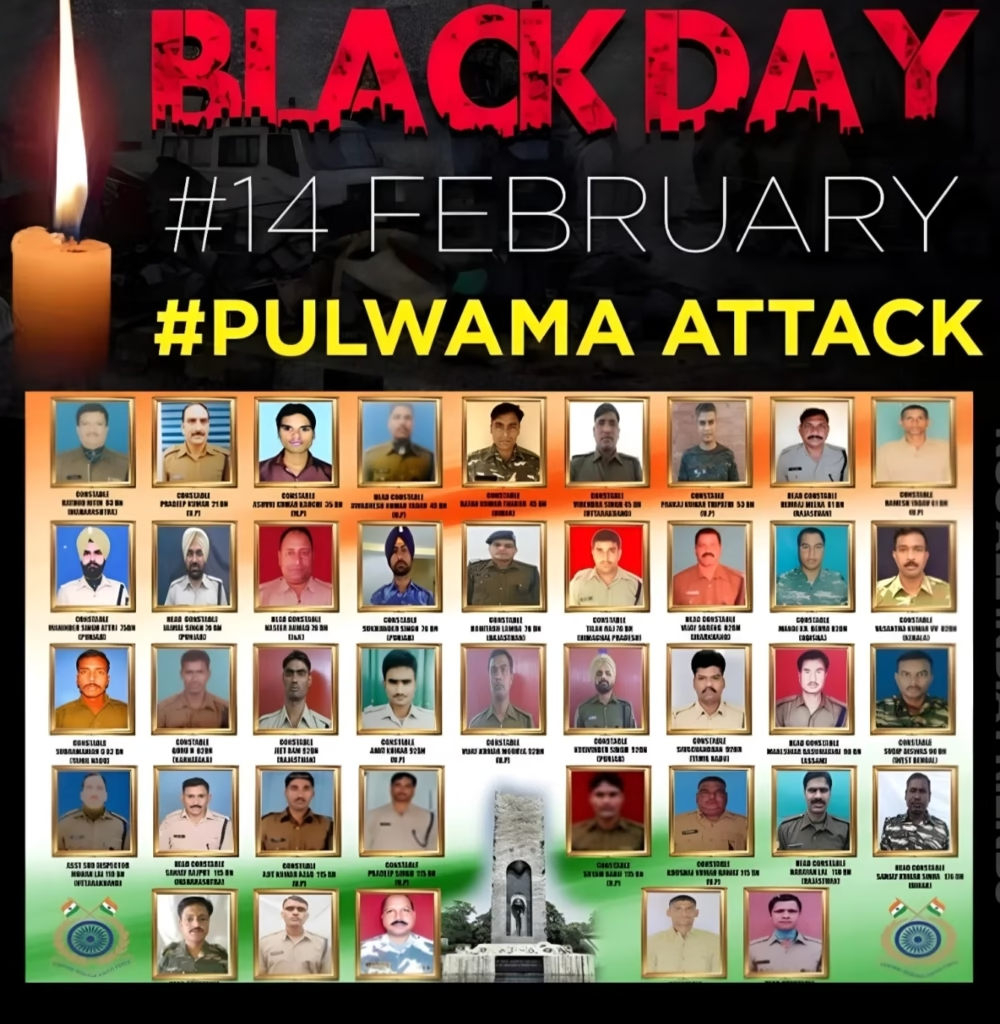A look back at the deadly 2019 Pulwama attack, security lapses, India’s bold Balakot airstrikes, and how the nation honors its martyrs while staying vigilant against future threats. Never forget, never forgive!
1. February 14, 2019: The Day That Shook India
Six years ago, on February 14, 2019, India witnessed one of its deadliest terrorist attacks. A suicide bomber rammed an explosives-laden SUV into a CRPF convoy on the Jammu-Srinagar National Highway, killing 40 brave soldiers. The Pulwama attack, claimed by Pakistan-based terror group Jaish-e-Mohammed, left the nation in shock and mourning.
2. How Did It Happen? Security Lapses and Missed Warnings
After Pulwama attack, an internal CRPF inquiry pointed to two major lapses:
- Lack of Specific Intelligence Inputs – There was no prior warning about such an attack, raising serious concerns about intelligence gathering.
- Unusually Long Convoy – A total of 78 vehicles carrying over 2,500 personnel were moving together, making them an easy target.
Despite multiple terror incidents in Jammu and Kashmir before 2019, including the Uri (2016) and Pathankot (2016) attacks, no major security overhaul was undertaken to prevent a suicide bombing of this scale.
3. Could the Attack Have Been Prevented? The Air Travel Request Controversy
One of the most debated questions is whether Pulwama attack could have been avoided. Reports suggest that the CRPF had requested air travel for its personnel, but this was allegedly denied by the Home Ministry. This claim, however, has never been officially acknowledged or denied by the government.
4. The Immediate Aftermath: India’s Strong Response
The Pulwama attack triggered nationwide grief and outrage. Massive protests were held, and there was an outpouring of support for the martyrs’ families.
In retaliation, on February 26, 2019, the Indian Air Force launched the Balakot airstrikes, targeting a Jaish-e-Mohammed training camp in Pakistan. The message was clear: India would no longer tolerate cross-border terrorism.
5. Pakistan’s Open Admission and the Global Fallout
While Pakistan initially denied any involvement, Pakistani minister Fawad Chaudhry later admitted in Parliament, saying, “Humne Hindustan ko ghus ke maara” (We hit India inside its territory). This statement confirmed suspicions about state-backed terrorism.
India responded Pulwama attack by:
- Revoking Pakistan’s Most Favored Nation (MFN) status to increase economic pressure.
- Launching diplomatic efforts to isolate Pakistan internationally.
- Urging global action against Jaish-e-Mohammed and other terror groups operating from Pakistan.
6. Lessons Learned: Has India’s Security Improved?
Following the attack, India took several steps to enhance national security:
- Convoy Movement Revamp – Changes were made to reduce the vulnerability of large troop movements.
- Better Surveillance and Intelligence Sharing – Agencies have increased coordination to detect and neutralize threats in advance.
- Stronger Counter-Terrorism Measures – More emphasis has been placed on counter-infiltration operations.
These efforts have significantly reduced major terror attacks in the last six years. However, infiltration and recruitment of local youth by terror groups remain a challenge.
7. A Nation Remembers: Honoring the Pulwama Martyrs
Every year, India pays tribute to the 40 CRPF jawans who made the ultimate sacrifice. Memorials, ceremonies, and tributes pour in from across the country.
On this anniversary, Home Minister Amit Shah reaffirmed the government’s commitment, stating, “We will always remember their courage. Their valor will continue to inspire generations.”
Prime Minister Modi also honored their sacrifice, urging citizens to stay united in the fight against terrorism.
8. The Road Ahead: No Room for Complacency
While there has been no major cross-border attack since Pulwama, threats persist. India continues to push for:
- Stronger counter-terrorism laws
- Better border security measures
- Greater international cooperation against terror sponsors
The Pulwama attack remains a grim reminder of the challenges India faces. But it also serves as a testament to the resilience of the nation and its armed forces.
9. Never Forget, Never Forgive
As India marks six years since the Pulwama attack, the message is clear: The country will never forget the sacrifices of its soldiers, and it will never forgive those responsible.
Their bravery and dedication continue to inspire millions. The nation stands united in remembrance, vowing to remain vigilant and stronger than ever before.
In This Article-
For the latest news and top of the line assessment of technology, politics, education, sports, follow News To Your Home on X, Facebook, WhatsApp, Instagram.
